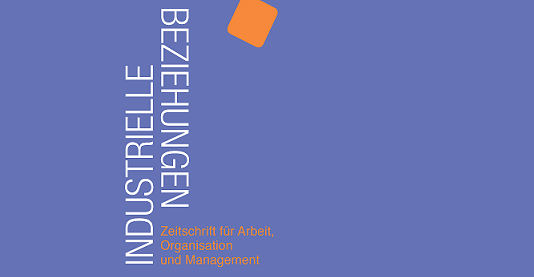Neue Mitbestimmungspraktiken in der digitalen Transformation der „Industrie 4.0“ : Befunde aus dem gewerkschaftlichen Projekt „Arbeit 2020 in NRW“
Die Bezeichnung „Industrie 4.0“ hat sich als Synonym für den digitalen Wandel im deutschen Industriesektor etabliert. Die damit verbundenen Umbrüche werden jedoch nicht technisch vorgegeben, sondern sind in den Betrieben arbeitspolitisch gestaltbar – und damit Gegenstand der Mitbestimmung der Betriebsräte. Eine Antwort auf diese Herausforderungen ist das gewerkschaftliche Projekt „Arbeit 2020 in NRW“ als eines der aktuell avanciertesten betriebspolitischen Projekte deutscher Gewerkschaften. Im Rahmen des Projekts sollen in den Betrieben das Wissen um Veränderungen erhöht, arbeitspolitische Themen erschlossen und schließlich auch Vereinbarungen mit der Unternehmensseite ausgehandelt werden. Die Befunde zeigen, dass auf diese Weise die Ressourcen und die Handlungsfähigkeit der Betriebsräte gestärkt, beteiligungsorientierte Mitbestimmungspraktiken eingeübt und strategische Orientierungen der Betriebsräte gefördert werden können. Insgesamt lässt sich folgern, dass das „duale“ Zusammenspiel von Betriebsräten und Gewerkschaften im Betrieb als Grundlage einer handlungsmächtigen Interessenvertretung immer mehr an Bedeutung gewinnt.
Industry 4.0 has become a synonym for digitalization in the German manufacturing sector. However, the changes going along with digitalization are not determined by technology, but open for the strategies and influences of political actors, both from the state and from employers, unions and works councils. How are unions and works councils prepared to cope with the challenges of digitalization? One answer to these challenges is the union project “Work 2020 in North Rhine-Westphalia. This can be regarded as one of the most advanced projects the German trade unions have developed as a reaction on digitalization. It focuses on creating knowledge, developing political topics and negotiating agreements in the plants. The analysis shows that the project was rather successful in strengthening resources and capabilities of works councils, exercising new forms of employee participation and promoting strategic orientations of the works councils. The dual structure of the German system of industrial relations in the plants, the interplay and cooperation between unions and works councils, becomes more and more important as a precondition for powerful interest representation in times of more radical economic changes.
Vorschau

Zitieren
Zitierform:
Haipeter, Thomas et al. (2019): Neue Mitbestimmungspraktiken in der digitalen Transformation der „Industrie 4.0“: Befunde aus dem gewerkschaftlichen Projekt „Arbeit 2020 in NRW“. In: Schwerpunktheft: Digitalisierung und Arbeitsbeziehungen in betrieblichen Arbeitswelten: Zwischen revolutionärem Wandel und digitalem Inkrementalismus. S. 130–149. Online unter: https://nbn-resolving.org/urn:nbn:de:hbz:464-20211006-133910-0.
Zitierform konnte nicht geladen werden.
Rechte
Rechteinhaber:
Verlag Barbara Budrich GmbH, Leverkusen
Nutzung und Vervielfältigung:
Dieses Werk kann unter einer Creative Commons Namensnennung - Weitergabe unter gleichen Bedingungen 4.0 Lizenz (CC BY-SA 4.0)
Creative Commons Namensnennung - Weitergabe unter gleichen Bedingungen 4.0 Lizenz (CC BY-SA 4.0)
genutzt werden.
